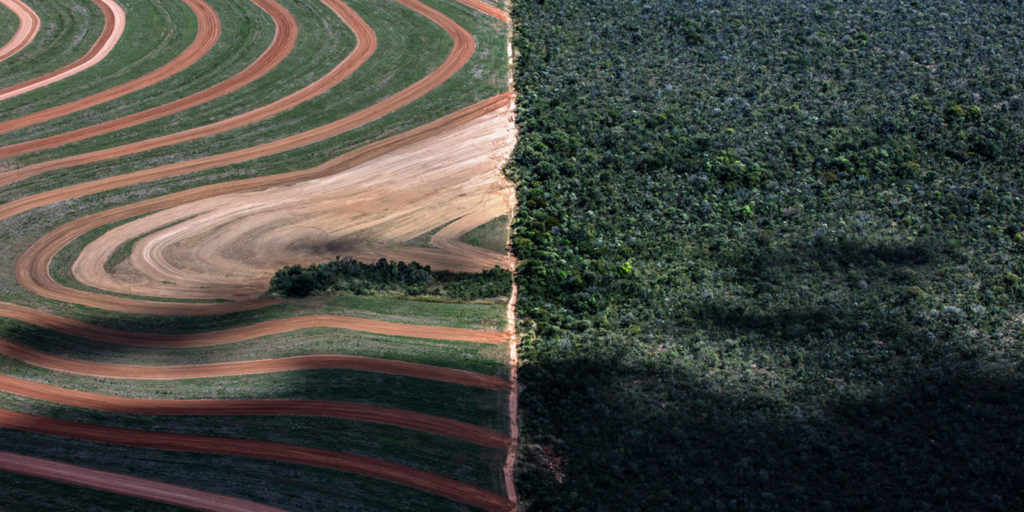Brazil is recognised as a world leader in the production of agri-food commodities in large, highly mechanised farms, but also as a centre of resistance movements advocating for land rights and food sovereignty. Brazil’s portrayal as a success story of agricultural modernisation is invariably linked to the expansion of the production frontier and, specifically, the conversion of the Cerrado region into industrial farmland.

A vast savannah zone in the centre of the country, the transformation of the Cerrado region has been driven by intensive soybean and livestock production for export. However, the Cerrado ‘miracle’ has come at a high cost. Besides the environmental impacts of land clearance and the removal of native vegetation, the expansion of the frontier has exacerbated poverty and injustice, deepening the historical inequality of land distribution and wealth.
This issue of the IDS Bulletin highlights the legacy of tensions in the Cerrado, arguing that this legacy cannot be ignored in debates on global agri-food systems to which the region is increasingly central. Authored mainly by early career scholars from Brazilian and British universities, the papers here offer new research and empirical material on the battles that have engulfed people and nature in the Cerrado. Three themes emerge: the logic of extraction in an agricultural frontier; the grabbing of natural resources in the name of sustainability; and conflicts and resistance movements.
This IDS Bulletin concludes with an agenda for research and action to reclaim the Cerrado, alongside other agricultural frontier territories across the world, as part of the global effort towards sustainable transformation of agri-food systems to secure justice for nature and people alike.
Intensive farming and agri-food markets in Brazil have been enabled by the expansion of the production frontier into the vast Cerrado region. But the Cerrado ‘miracle’ has come at a high cost. The environmental impacts of land clearance, alongside tensions and violence in the Cerrado, have deepened the inequality of land distribution and wealth. However, an agenda for research and action could secure justice for nature and people alike, as part of the global effort towards a sustainable transformation of agri-food systems.
Articles
Frontier Territories: Countering the Green Revolution Legacy in the Brazilian Cerrado
Lídia Cabral, Sérgio Sauer and Alex Shankland
Introduction: Reclaiming the Cerrado – A Territorial Account of a Disputed Frontier
Lídia Cabral, Sérgio Sauer and Alex Shankland
Transformations of the Agricultural Frontier in Matopiba: From State Planning to the Financialisation of Land
Cássio Arruda Boechat, Fábio Teixeira Pitta, Lorena Izá Pereira and Carlos de Almeida Toledo
Matopiba’s Disputed Agricultural Frontier: Between Commodity Crops and Agrarian Reform
Estevan Coca, Gabriel Soyer and Ricardo Barbosa Jr
Green Grabbing in the Matopiba Agricultural Frontier
Anderson Antonio Silva, Acácio Zuniga Leite, Luís Felipe Perdigão de Castro and Sérgio Sauer
Brazilian Agricultural Frontier: Land Grabbing, Land Policy, and Conflicts
Matheus Sehn Korting, Débora Assumpção e Lima and José Sobreiro Filho
Environmental Policy Reform and Water Grabbing in an Agricultural Frontier in the Brazilian Cerrado
Andréa Leme da Silva, Ludivine Eloy, Karla Rosane Aguiar Oliveira, Osmar Coelho Filho and Marcos Rogério Beltrão dos Santos
Mapping Fire: The Case of Matopiba
Dernival Venâncio Ramos Júnior, Vinicius Gomes de Aguiar and Komali Kantamaneni
Brazilian Civil Society and South–South Cooperation: Countering the Green Revolution from Abroad
Laura Trajber Waisbich and Lídia Cabral
Glossary
Lídia Cabral, Sérgio Sauer and Alex Shankland
Notes on Contributors
Lídia Cabral, Sérgio Sauer and Alex Shankland
